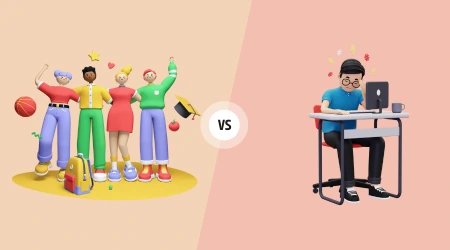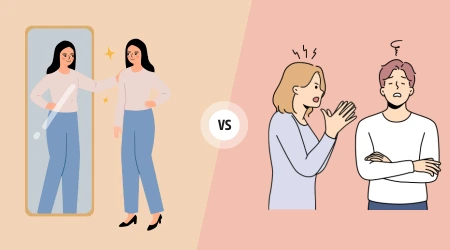Have you ever asked yourself the following question?: “What is my personality type?” The answer is Yes, for sure.
Creating a fun personality test to learn more about personality traits has always been an engaging activity for people all over the world. Personality Traits Test is an excellent way to learn more not only about yourself but also about the people surrounding you.
To learn what personality type you belong to, you can pass a personality quiz. Whether you are trying to understand your character traits better or want to improve relationships with other people surrounding you, passing personality tests will help you in this journey.
There are several famous personality tests you can choose to pass, such as the DiSC Personality Test, the 16 Personalities Test, the Truity Test, etc. You can choose which of these quizzes to pass based on what characteristics you want to explore for yourself.
Conducting personality quizzes is not only beneficial for individuals looking for their personality traits. Personality Tests also help website owners increase user engagement, the customer satisfaction, and generate leads.
In this article, we will provide you with 50 Free Personality Test Questions to create your own personality test.
Personality Test Questions
Introvert vs Extrovert

In this section, we will provide 10 questions that will help you identify whether you are an introvert or an extrovert.
Introverts tend to be patient and passive. They prefer to spend time alone and avoid interactions with large groups of people. They prefer deep conversations and think longer before expressing their thoughts. Introverts are having difficulties when adapting to the new environment or people.
Extroverts are impatient and active. They love socializing with large groups of people and avoid loneliness. These types of people tend to express their thoughts quickly without thinking much about what they will say. They adapt to new people and conditions without any difficulties.
So, let’s identify whether you are an Introvert or an Extrovert.
1. What do you prefer to do in your free time?
- I engage in hobbies or creativity (I)
- I spend time with friends (E)
2. How do you react to large social gatherings?
- I feel uncomfortable (I)
- I enjoy socializing (E)
3. What is more important to you: time in company or time alone?
- Time alone (I)
- Time in Company (E)
4. How do you prefer to spend your weekends?
- Taking a walk outdoors (I)
- Meeting with friends (E)
5. How do you feel about meeting new people?
- I find it difficult to make acquaintances (I)
- I love meeting new people (E)
6. What inspires you the most in life?
- Nature and travel (I)
- Communicating with people (E)
7. How do you cope with stress?
- I spend time alone (I)
- I engage in sports or hobbies (E)
8. What is your communication style in a group?
- I prefer to listen more than speak (I)
- I actively participate in discussions (E)
9. How do you feel about public speaking?
- I feel uncomfortable (I)
- I enjoy it (E)
10. What is your source of energy?
- Solitude and reflection (I)
- Socializing with friends and having fun (E)
Optimistic – Pessimistic

Optimistic people tend to see only the bright side in every situation. They have positive feelings about the future and see challenges as opportunities to grow. Optimistic people have problem-solving skills and mainly focus on future victories rather than thinking about past failures.
Pessimistic people focus on worst-case scenarios and think much about what could go wrong. They have doubts about every positive outcome in their lives. Pessimistic people don’t have problem-solving skills and avoid taking risks.
In this section of the article, we will provide questions that will help you determine whether you are optimistic or pessimistic. So, let’s dive into this.
1. How do you usually perceive challenges or obstacles in life?
- As opportunities for growth and improvement (O)
- As problems that are hard to overcome (P)
2. What do you expect when starting a new project?
- I believe that with the right effort, everything will work out (O)
- I think about what might go wrong (P)
3. How do you handle failures or setbacks?
- I learn from it and move forward (O)
- I dwell on mistakes and feel discouraged (P)
4. What comes to mind first when you think about the future?
- Exciting possibilities (O)
- Potential difficulties and problems (P)
5. How do you perceive unexpected life changes?
- As a chance for new opportunities (O)
- As a threat to stability and comfort (P)
6․ When you hear bad news, what is your first reaction?
- I try to see the positive side of the situation (O)
- I immediately start thinking of the worst (P)
7. How do you feel about taking risks?
- I see risk as a necessary part of achieving success (O)
- I avoid risk because it could lead to failure (P)
8. How do you usually view unfamiliar situations?
- I feel excited and joyful about new experiences (O)
- I worry that something bad might happen (P)
9. How do you feel when meeting new people?
- I look forward to interesting connections and pleasant conversations (O)
- I worry that something might go wrong (P)
10. How do you assess your chances for success in life?
- I am confident that hard work will lead to success (O)
- I think success depends on luck and circumstances (P)
Confident – Arrogant

Confident people are open to criticism and feedback. They use the feedback to improve and grow as a person. These types of people usually support other people and consider others’ opinions. Confident people always take risks as they are sure of their abilities and skills.
Conversely, arrogant people reject criticism and take it as an offense. They usually disregard the opinions of other people and overestimate their abilities and skills. The people with confident characteristic traits think what they know is the best and this prevents growth and improvement.
In this section, we will provide questions to determine whether you are a confident or arrogant person. So, let’s explore this.
1. How do you perceive your achievements?
- I am proud of my accomplishments, but I remain open to new challenges (C)
- I believe my successes speak for themselves, and I don’t need to learn anything new (A)
2. How do you respond to criticism?
- I see criticism as an opportunity to improve myself (C)
- I think people criticize me out of jealousy for my success (A)
3. How do you behave in a group?
- I share my ideas and listen to the opinions of others (C)
- I’m confident my ideas are the best, and I don’t need to listen to others (A)
4. How do you handle failures?
- I see them as temporary obstacles that can be overcome (C)
- Failures happen, but it’s not my fault—it’s external circumstances (A)
5. How do you act when you win a competition?
- I celebrate the victory and thank everyone who helped me (C)
- I believe I won solely because of my abilities, and no one helped me (A)
6. How do you perceive other people’s opinions?
- I believe it’s important to consider others’ opinions, even if I don’t always agree (C)
- I’m confident my opinion is always right, and I don’t care what others think (A)
7. How do you assess your professional skills?
- I’m confident in my skills, but I’m always striving to improve (C)
- I’ve already mastered my field, and I don’t need to learn anything new (A)
8. How do you feel in a leadership role?
- I’m confident I can lead a team while considering their needs and opinions (C)
- I’m a leader because no one can do it better than me (A)
9. How do you approach helping others?
- I’m happy to help, knowing it can improve their results (C)
- I rarely help, because I think everyone should figure things out on their own (A)
10. How do you assess your potential in life?
- I’m confident I can achieve a lot if I keep working on myself (C)
- I’m already at the top, and I don’t need to make much effort to continue my success (A)
Wrapping Up!
Creating a Personality Test for your website will be a great help both for you to learn more about your website visitors, and, for them to learn more about themselves and other people surrounding them. Learning the personality traits of other people can help to construct healthier relationships.
By passing personality tests you can help you understand how other people will behave themselves in this or that particular situation.
There are so many advanced tools and plugins to create personality tests. Among all these plugins, the WordPress Quiz Plugin stands out with its powerful features to create engaging and interactive personality quizzes. With the help of the WordPress Quiz Plugin, you can create personality tests such as the 16 Personalities Test, the DOPE Personality Test, the Enneagram Personality Test, and many more.
So, in this article, we have provided free personality test questions you can use to create advanced and engaging personality tests for your website. So, use these questions to create personality tests that will help you boost user engagement and learn more about your website visitors.
- Best 5 Web to Print Software for Print Shops in 2025 - March 27, 2025
- Integrating SaaS Solutions for Streamlined Accounting Processes - March 25, 2025
- Free Personality Test Questions - October 7, 2024


